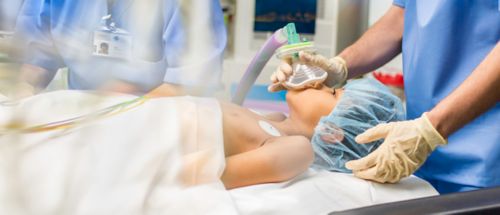What is malignant hyperthermia?
Malignant hyperthermia (MH) is a serious reaction to certain anesthesia medicines and another medicine called succinylcholine. People with this response may have a rare gene change, called a mutation. A person with this gene change has a genetic predisposition called malignant hyperthermia susceptibility (MHS).
MH can be fatal if treatment is delayed. But with prompt treatment, survival rates are usually above 90%.
Symptoms of malignant hyperthermia
Usually, people with MHS show no symptoms until they are exposed to certain medicines known as “triggers.”
Symptoms include:
- Heavy breathing
- Fast heartbeat
- Sweating
- Tense muscles or muscle spasms
- Rising body temperature
Causes of malignant hyperthermia
A change in the RYR1 or CACNA1S gene causes MHS. In most cases, the gene change is passed down through the family. But sometimes the gene change occurs at random.
Before your child has surgery, your health care team will ask if anyone in the family has had severe reactions to anesthesia. These details will help the doctor choose the best anesthesia medicines for your child.
Risk factors for malignant hyperthermia
A change in the RYR1 or CACNA1S gene can put your child at a higher risk of developing MH. This is especially true if they are exposed to certain medicines known as triggers. Some people may develop MH the first time they are given 1 of these medicines. Others might react only after getting the medicine several times.
Family history or past personal medical history can also put your child at risk for MH. Usually, before anesthesia, the anesthesia team will ask if your child or your family members have had any anesthesia and if they had any side effects from it. If you or a family member had a reaction during or right after anesthesia, your doctor will take this information into account when choosing which anesthesia medicine you should get.
Tests for malignant hyperthermia
Genetic test
A genetic test can show if your child has a gene change that puts them at risk of reacting to some anesthesia medicines.
If the test shows that your child has a change in the RYR1 or CACNA1S gene, your doctor will not give your child certain medicines.
The test will show if your child has a normal risk or a higher risk of developing MH.
- Normal risk: Your child does not have a high-risk gene change or history of a serious reaction to anesthesia. A person in this group is less likely to develop MH. About 99.98% of people are in this group.
- Increased risk: Your child has a high-risk gene change or history of a serious reaction to anesthesia. They are more likely to develop MH if given some types of anesthesia. About 2 in 10,000 people are in this group. Be sure to let all of your child’s doctors know about this result.
Muscle biopsy test
Your doctor may also refer your child for a muscle biopsy test. This test is called a caffeine halothane contracture test. It uses tissue taken from your child’s muscle. It looks at whether the muscle tissue reacts to certain chemicals. The test is done at a special testing center.
Treatment of malignant hyperthermia
If your child has MH, your care team uses treatments such as:
- Dantrolene, a medicine to relax your child’s muscles
- Ice packs to cool the body
- IV fluids (given by vein)
- Sedation
- Other supportive care




